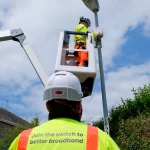UK Ranks 6th out of 169 Countries for 2021 Internet Accessibility

A new 2021 Worldwide Internet Accessibility Index has just been published by comparison site Broadband Choices, which ranks 169 countries and territories on the quality of their broadband and mobile infrastructure to find the world’s most connected countries. Interestingly the United Kingdom managed to place 6th overall.
The accessibility index attempts to score based on several key indicators, including fixed line broadband speeds, the price and affordability of home internet packages (business broadband and bundle deals are excluded), the cost of mobile data (per 1GB) on SIM Only plans, the percentage of the population with access to the internet, mobile internet (3G, 4G etc.) coverage, the number of public WiFi hotspots and the percentage of webpages by national language.
Overall Denmark came top of the table this year. “Unusually, Danish internet users enjoy affordable internet and some of the best connection speeds despite the market being heavily dominated by one provider – proving that competition isn’t always necessary. Less than 0.1% off web pages are written in Danish, however, with a large majority of Danes speaking English as a second language, it’s unlikely to be a significant barrier to accessibility,” said the study.
Advertisement
By comparison the UK ranked an impressive 6th place thanks, at least in part, to a good level of affordability in both fixed and mobile broadband connections. But despite this the UK’s average download speed was a surprisingly low 20.06Mbps, which is significantly lower than any other study we’ve seen in the past year.
Sadly, the full results don’t show how the UK scores for every single category, so it’s hard to know where the other positive results came from, although we probably do well for public WiFi availability, general internet availability and the percentage of webpages by national language may be disproportionately high for English as a global standard.
2021 Worldwide Internet Accessibility Index Results
In terms of affordability, we note that the study weights some of its scoring by the average (median) salary for each country in $ USD (i.e. the cost of the average monthly broadband deal as a percentage of median household salary), which is a good thing to do.
On the other hand, the index gets its data on broadband speeds from M-Lab (this appears to use some sort of speedtest based study), which found that the United Kingdom had an average (median) download speed of just 20.06Mbps. But this is well below the 64Mbps (download) recorded in Ofcom’s 2020 fixed line broadband speeds report (here) and the 76.49Mbps via Ookla’s end of 2020 data (here). Cable.co.uk also used M-Lab last year and got a higher result of 37.82Mbps for the UK (here).
Advertisement
Suffice to say that something or some context is missing from the index’s speed(s) figure. Admittedly Ofcom used a different methodology to M-Lab (i.e. the regulator directly tested connections via a modified router, which rules out key issues like poor WiFi and local network load etc.), but that’s still a huge gap.
Equally any speed testing based reports should always be taken with a pinch of salt because they can easily be misinterpreted. In particular, nobody should be equating such studies to directly reflect the availability of faster connections as the two are far from being in sync (not everybody takes a faster connection, even when it’s available to them).
Lest we forget the impact of other factors, such as poor home wiring, user choice of package, local network congestion (i.e. conducting a test while others or background tasks are using the network) and slow home WiFi etc.
| Rank | Country | Download (Mbit/s) | Cost Per Month ($) | Affordability | Cost 1GB Data ($) | Score |
| 1 | Denmark | 99.08 | 55.1 | 1.30% | 1 | 97.07 |
| 2 | Liechtenstein | 187.35 | 77.8 | 0.80% | 6.7 | 94.85 |
| 3 | United States | 34.14 | 60.4 | 1.44% | 9.6 | 93.45 |
| 4 | Hong Kong | 81.63 | 50.4 | 1.51% | 3.2 | 93 |
| 5 | Sweden | 71.56 | 48.4 | 1.37% | 2.6 | 92.2 |
| 6 | United Kingdom | 20.06 | 38.7 | 1.35% | 3.4 | 92.13 |
| 7 | Australia | 20.04 | 59.1 | 1.51% | 1.4 | 90.94 |
| 8 | Luxembourg | 56.67 | 58.2 | 0.95% | 3.8 | 90.32 |
| 9 | Switzerland | 95.26 | 77.7 | 1.18% | 12.8 | 90.25 |
| 10 | Andorra | 67.78 | 48.6 | 1.71% | 9.5 | 89.25 |
| 11 | New Zealand | 25.76 | 64.3 | 2.09% | 7.3 | 89.15 |
| 12 | Finland | 54.06 | 48 | 1.45% | 1.6 | 89.12 |
| 13 | Russia | 6.74 | 8.2 | 1.33% | 0.7 | 88.91 |
| 14 | Ireland | 13.77 | 58.2 | 1.60% | 3.4 | 88.82 |
| 15 | The Netherlands | 54.56 | 52.1 | 1.50% | 4.9 | 88.64 |
| 16 | Canada | 19.23 | 61 | 2.04% | 11.1 | 87.51 |
| 17 | Bahamas | 21.98 | 82.6 | 4.54% | 6.2 | 87.45 |
| 18 | Spain | 23.93 | 45.5 | 2.38% | 3.5 | 86.89 |
| 19 | Iceland | 35.25 | 73.3 | 1.78% | 3 | 86.32 |
| 20 | Belarus | 5.08 | 11 | 2.52% | 1.3 | 86.14 |
| 21 | Estonia | 24.54 | 32.6 | 2.38% | 2 | 85.71 |
| 22 | Poland | 23.87 | 17.8 | 1.76% | 1 | 85.61 |
| 23 | Romania | 28.26 | 10.3 | 1.28% | 1.5 | 85.46 |
| 24 | Israel | 16.88 | 24.5 | 0.84% | 0.6 | 85.37 |
| 25 | Barbados | 27.23 | 91.2 | 6.35% | 8.8 | 85.13 |
| 26 | Austria | 18.85 | 44.8 | 1.45% | 1.5 | 85.11 |
| 27 | Belgium | 32.33 | 54.4 | 1.83% | 7.1 | 84.65 |
| 28 | Hungary | 34.02 | 17.8 | 1.75% | 5.2 | 84.42 |
| 29 | Lithuania | 22.71 | 13.5 | 1.29% | 2.7 | 84.31 |
| 30 | Norway | 37.13 | 82.5 | 1.82% | 7.3 | 84.16 |
| 31 | Turkey | 4.75 | 13.8 | 2.61% | 1.8 | 84.09 |
| 32 | France | 10.27 | 33 | 1.17% | 2.2 | 84 |
| 33 | Germany | 22.67 | 38.6 | 1.18% | 4.8 | 84 |
| 34 | Slovenia | 20.27 | 37.1 | 2.73% | 2.8 | 83.61 |
| 35 | Japan | 32.27 | 48.7 | 1.64% | 5.6 | 83.42 |
| 36 | Serbia | 13.49 | 19.4 | 3.49% | 2.8 | 82.88 |
| 37 | Dominica | 7.36 | 56.5 | 14.36% | 7.3 | 82.8 |
| 38 | Italy | 11.88 | 36.3 | 1.71% | 1.1 | 82.73 |
| 39 | Brazil | 4.86 | 29.1 | 5.85% | 3.5 | 82.62 |
| 40 | Indonesia | 3.16 | 32.5 | 10.28% | 1.4 | 82.62 |
| 41 | Egypt | 3.52 | 17.4 | 7.81% | 1.2 | 82.59 |
| 42 | Slovakia | 19.55 | 20.8 | 2.03% | 4.6 | 82.46 |
| 43 | Kazakhstan | 1.39 | 11.5 | 2.72% | 0.9 | 82.45 |
| 44 | Chile | 4.17 | 37.1 | 4.32% | 2.4 | 82.29 |
| 45 | Kuwait | 3.35 | 69.7 | 3.90% | 3.5 | 82.2 |
| 46 | Croatia | 13.98 | 33.5 | 3.23% | 3 | 82.15 |
| 47 | Virgin Islands (U.S.) | 9.58 | 94.5 | 4.57% | 6.8 | 82 |
| 48 | Latvia | 14.22 | 18.4 | 1.96% | 5 | 81.98 |
| 49 | Bulgaria | 18.44 | 15.7 | 2.32% | 3.6 | 81.97 |
| 50 | Taiwan | 20.59 | 28 | 1.98% | 7.3 | 81.96 |
Mark is a professional technology writer, IT consultant and computer engineer from Dorset (England), he also founded ISPreview in 1999 and enjoys analysing the latest telecoms and broadband developments. Find me on X (Twitter), Mastodon, Facebook, BlueSky, Threads.net and Linkedin.
« Uswitch 2021 Awards Name Top UK Broadband and TV Providers





















































I have to question what “accessibility” means when a country with as heavy censorship as Belarus can rank 20th.
Fair point. They’re of course only taking a very linear view in the study and not considering the level of accessibility within the network itself.
Yet another useless ranking.
But wait a minute…this doesn’t fit the ‘superfarce’ doom and gloom narrative!?!
This is a good sign, and if rural was measured only, UK would be higher I suspect, if not the highest. Good time to get after 99%+ coverage using the monies within the BDUK process to finish.
I do not understand why subsidised and indeed unsubsidised FTTC in Cumbria needs to be overbuilt before the in-fill at the edge is concluded. Fibre on Demand was launched in 2014 for this purpose.
At some point hopefully you will understand and the SNR of your comments will improve substantially as a result, though it has been a long time with little progress.
Carl_T Actually progress is good. Just the English counties need a bit more -500k properties more under contract. There is a dodgy accounting treatment to challenge. You may have noticed a third type of clawback has had to be invented to accommodate the capital owed, ‘savings’ clawback (excess costs), ‘operational’ clawback which is the capital owed and the profit share clawback. In 2016 BT and Minister told Parliament SC capital was paid. Not so.
Grow up carl. We’re also tired of your holier-than-thou posts.
🙂 Carl had a good point though!
“Fibre on Demand was launched in 2014 for this purpose.”
FTTPoD, for all practical purposes, is a dead product. It’s overpriced, only a very limited total of orders per year are accepted, and order fulfillment often takes months or even more than a year. And it doesn’t provide symmetric broadband.
Gnewton .. your right but there is no reason it could not made to work. Perhaps once Ofcom have finished their investigation into the B-USO quotes, a more regular and standard approach could be defined, including visibility of the BT contributions.
BT have already been fined ~£6m for irregular use of FoD in Northern Ireland.
So not even an average speed of the coveted “Not really, but we’ll pretend it is because we get to invest less” SUPER-FAST!!! moniker! Speaks volumes.
that list don’t look right, united states does not rank that high for sure.
I am sorry because because my country haven’t
Who complied this list. What a bunch of lies.
Taiwan 50th??
USA 3rd???
France, Germany and Japan all have a better internet service than we do.
What a joke list.
And people actually believe these lies.
What is the world coming to.